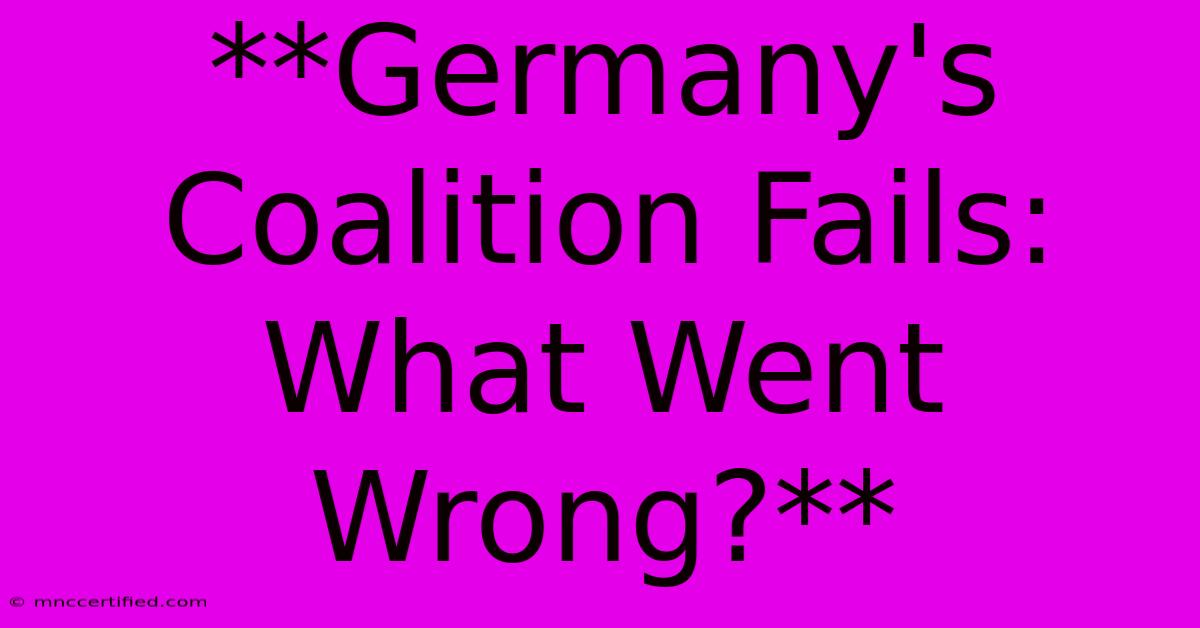**Germany's Coalition Fails: What Went Wrong?**

Table of Contents
Germany's Coalition Fails: What Went Wrong?
The collapse of Germany's governing coalition, a historic event in the country's post-war politics, has sent shockwaves through the nation and beyond. The three-party coalition, formed in 2021 between the Social Democratic Party (SPD), the Green Party, and the Free Democratic Party (FDP), lasted just under two years before imploding over a contentious issue.
The Trigger: A Failed Agreement on Housing Reform
The final straw for the coalition was a disagreement over housing reform. The Green Party, advocating for increased social housing and rent control, clashed with the FDP's stance of promoting free market solutions. This disagreement, while seemingly specific, exposed deeper tensions and underlying issues that had been simmering beneath the surface.
Beyond Housing: A Deeper Look at the Cracks
While the housing issue was the immediate catalyst, the coalition's demise is rooted in several other factors:
- Ideological Differences: The three parties, representing distinct political ideologies, struggled to find common ground on key issues. This ideological friction became increasingly apparent as they navigated complex policy decisions.
- Lack of Unity: The coalition lacked internal cohesion and shared vision. The disparate agendas of the three parties made it challenging to reach consensus and implement effective policies.
- Public Perception: The coalition faced mounting criticism for its handling of various issues, including the energy crisis and the Ukraine war. This public perception contributed to a decline in confidence and eroded public support.
- Political Dynamics: The FDP, a smaller party in the coalition, felt increasingly marginalized. Their perceived lack of influence contributed to their growing frustration and eventual withdrawal from the coalition.
Consequences of the Collapse:
The collapse of the coalition has significant consequences for Germany:
- Political Instability: The immediate consequence is a period of political uncertainty as the country faces new elections. This instability could have a ripple effect on the economy and foreign policy.
- Policy Stalemate: The collapse means a pause in the implementation of crucial policies, including the ambitious climate change targets and housing reforms.
- Impact on the European Union: Germany's role within the EU is likely to be affected, especially in light of the ongoing challenges, including the Ukraine war and economic instability.
What's Next for Germany?
The path forward for Germany is unclear. Early elections are expected, with the potential for a new coalition to be formed. However, the deep-seated divisions within the political landscape raise questions about the feasibility of forming a stable government. The country faces a pivotal moment as it navigates the complex challenges of the 21st century, and the outcome of the upcoming elections will determine its future direction.
Keywords: Germany, Coalition, Collapse, SPD, Green Party, FDP, Housing Reform, Ideology, Policy, Ukraine, Energy Crisis, European Union, Election, Political Instability, Policy Stalemate

Thank you for visiting our website wich cover about **Germany's Coalition Fails: What Went Wrong?** . We hope the information provided has been useful to you. Feel free to contact us if you have any questions or need further assistance. See you next time and dont miss to bookmark.
Featured Posts
-
Does Renters Insurance Cover Trampolines
Nov 08, 2024
-
Day Of The Jackal Show Vs Book Key Differences
Nov 08, 2024
-
Ravens Win Jacksons Tightrope Scramble Sparks Rally
Nov 08, 2024
-
Scissor Sisters Ticket Sale Friday Time
Nov 08, 2024
-
Emergency Dental Care Without Insurance
Nov 08, 2024